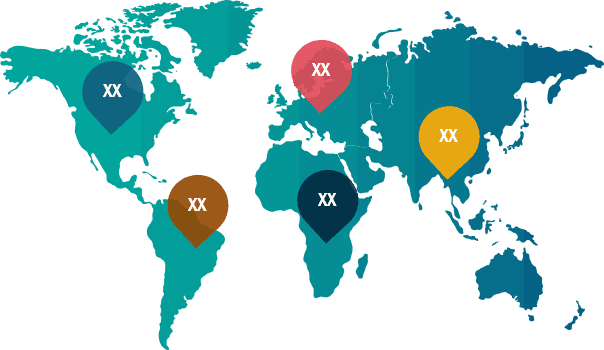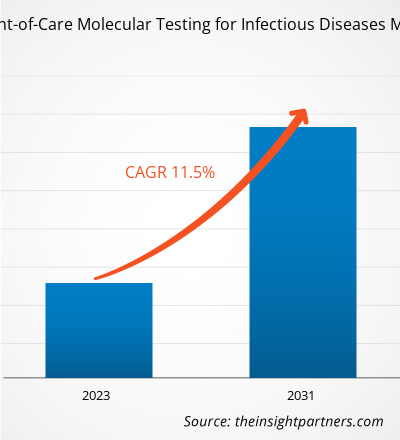北美传染病即时分子检测市场规模预计将从 2023 年的 10.9 亿美元增至 2031 年的 26.2 亿美元。预计 2023-2031 年期间该市场的复合年增长率将达到 11.5%。产品获批和上市数量的增加可能仍是市场的主要趋势。
北美传染病即时诊断分子检测市场分析
传染病的流行率不断上升以及对快速诊断解决方案的偏好是推动市场发展的关键因素。此外,对传染病诊断研发和资金的日益关注预计将为未来几年北美传染病即时诊断市场的增长创造丰厚的机会。例如,2023 年 1 月,非营利性行为科学倡议组织 19 to Zero 通过教育补助金从 BD 获得了资金,用于在初级保健环境中进行即时诊断测试试点。除了提供资金奖励外,还提供了多台 BD Veritor Plus 系统分析仪和 BD Veritor 快速检测系统,以促进对甲型流感和乙型流感、呼吸道合胞病毒、SARS-CoV-2、A 组链球菌和三重链球菌的即时诊断测试。
北美传染病即时诊断分子检测市场概况
传染病对公众健康产生不利影响,导致发病率、死亡率和经济负担。有效管理、治疗和预防这些健康状况需要准确及时的诊断。分子诊断技术、实验室检测和即时检测用于诊断艾滋病毒、结核病和丙型肝炎;筛查宫颈癌的人乳头瘤病毒;以及监测患者的健康和治疗进展。医疗保健提供者转向即时检测以简化诊断流程、减少周转时间并加强患者护理。这些测试还可以在传染病爆发期间简化诊断。根据美国疾病控制与预防中心 (CDC) 在 2022 年发布的数据,佛罗里达州 (美国) 遭受了甲型肝炎、侵袭性脑膜炎球菌病 (IMD) 和 mpox(以前称为猴痘)的并发流行病。Mpox 病例更多地集中在南佛罗里达州,并在 8 月达到顶峰。相比之下,甲型肝炎和 IMD 疫情集中在佛罗里达州中部,并在 3 月至 6 月达到顶峰。佛罗里达州报告了近 2,845 例腮腺炎病例,这是全球疫情的一部分。52% 的腮腺炎患者感染了 HIV,而甲型肝炎和 IMD 病例分别为 21% 和 34%。这些病原体包括甲型肝炎、腮腺炎和脑膜炎球菌病。快速识别和控制传染性病原体的需求推动了北美对创新型即时检测解决方案的需求。
定制研究以满足您的需求
我们可以优化和定制标准产品无法满足的分析和范围。这种灵活性将帮助您获得业务规划和决策所需的准确信息。
北美传染病即时诊断分子检测市场:

复合年增长率(2023 - 2031)11.5%- 2023 年市场规模
10.9 亿美元 - 2031年市场规模
26.2亿美元

市场动态
- 传染病发病率飙升
- 快速诊断解决方案的偏好日益增加
- 肿瘤学和慢性病管理领域的多样化应用
- 家庭和自我检测的增加反映了对市场的支撑
- 扩大医疗基础设施
- 更加重视传染病诊断的研发和资金投入
- 新产品开发
关键人物
- 雅培实验室
- 安捷伦科技公司
- 碧迪公司
- Bio Rad 实验室公司
- 康德乐公司
- 丹纳赫公司
- Cue健康公司
- QuidelOrtho 公司
- 赛默飞世尔科技公司
- F霍夫曼拉罗氏有限公司
区域概况

- 北美
市场细分
 疾病
疾病- HIV 检测
- 流感检测
- 性传播疾病检测
- 丙型肝炎病毒检测
- 热带疾病检测
- 呼吸道感染检测
- 医院内感染
- 链球菌
 技术
技术- 横向流动分析
- 量油尺
- 微流体
- 分子诊断
- 免疫测定
- 固相
 处方测试
处方测试- 基于处方的测试
- OTC测试
 样本
样本- 血液样本
- 尿液样本
- 鼻腔和口咽拭子样本
- 示例 PDF 通过定性和定量分析展示了内容结构和信息的性质。
北美传染病即时诊断分子检测市场驱动因素和机遇
快速诊断解决方案的偏好有利于市场增长
医疗保健提供者强调快速准确地诊断艾滋病毒感染、肝炎和流感等传染病。POC检测有助于快速识别特定病毒和细菌,从而及时做出治疗决定并改善患者预后。POC 检测提供结果所需的时间可能从几分钟到几小时不等,而传统的实验室检测可能需要几天才能产生结果。简单的检测试剂盒可以检测样本中病原体释放的蛋白质或细胞表面的蛋白质等;它们还可以检测血液或血清中因感染而产生的人体抗体。快速的周转时间使得能够迅速启动适当的治疗,并有助于防止传染病在社区内传播。POC 检测技术的进步进一步增强了这些诊断设备的准确性、灵敏度和易用性,使它们对医疗保健专业人员来说更加可靠和用户友好。这些技术创新扩展了 POC 检测传染病的能力,可以更精确地检测更广泛的病原体。此外,医疗保健领域对个性化医疗的日益倾向推动了对 POC 检测产品的需求。通过在护理点提供实时诊断信息,POC 测试使医疗保健提供者能够根据每个患者的感染状况定制治疗计划,从而提供更有效和个性化的护理。
加大对传染病诊断研发和资金投入
研发 (R&D) 是制药和生物制药公司的重要组成部分。研发使市场参与者能够开发具有巨大医疗和商业潜力的各种治疗应用的新产品。下表显示了根据 NIH 采用的合同、拨款和其他资助机制,各种研究和疾病类别的年度资金。
传染病和资金
研究/疾病领域 | 2019(百万美元) | 2020(百万美元) | 2021(百万美元) | 2022(百万美元) |
新发传染病 | 2,950 | 4,867 | 5,069 | 4,318 |
传染病 | 6,313 | 8,301 | 8,599 | 8,019 |
性传播感染 | 354 | 394 | 404 | 419 |
注:已考虑当前货币的兑换率。
资料来源:年度报告和 Insight Partners 分析
为了应对实验室能力和分子检测试剂的短缺,以及传染病病例的不断增加,诊断检测制造商提供了快速且易于使用的设备,以促进实验室外的检测。
北美传染病即时诊断分子检测市场报告细分分析
促成北美传染病即时诊断分子检测市场分析的关键部分是疾病、技术、处方检测、样本、分销渠道和最终用户。
- 根据疾病,北美传染病即时分子检测市场分为 HIV 检测、流感检测、性传播疾病检测、丙型肝炎病毒检测、热带疾病检测、呼吸道感染检测、医院内感染、链球菌等。根据分子诊断,市场进一步分为聚合酶链反应 (PCR)、等温核酸扩增技术 (INAAT) 等。呼吸道感染检测部分在 2023 年占据了最大的市场份额。
- 根据技术,市场细分为横向流动分析、试纸、微流体、分子诊断、免疫测定、固相等。横向流动分析部分在 2023 年占据了最大的市场份额。
- 就样本而言,市场细分为血液样本、尿液样本、鼻腔和口咽拭子等。血液样本部分在 2023 年占据了最大的市场份额。
- 就最终用户而言,市场细分为医院和诊所、家庭护理机构、门诊和紧急护理设施、疗养院和辅助生活设施、研究实验室和诊断中心。市场根据医院和诊所进一步细分为临床实验室、专业医生办公室和其他。医院和诊所部门在 2023 年占据了最大的市场份额。
北美传染病即时诊断分子检测市场份额(按国家)分析
北美传染病即时诊断分子检测市场报告范围主要分为三个国家:美国、加拿大和墨西哥。
传染病的流行率不断上升、老年人口不断增加以及主要参与者推出的产品数量激增是美国传染病即时检测市场增长的主要因素。老龄化是传染病的一个突出风险因素,因为 60 岁以上的人可能免疫力下降。根据人口参考局 2020 年发布的一项研究,2020 年美国 65 岁及以上人口为 5500 万,预计到 2060 年这一数字将达到 9500 万。美国的监管机构严格监控即时检测 (POC) 产品的开发。例如,2021 年 3 月,美国食品药品监督管理局 (FDA) 批准 Binx Health IO CT/NG Assay 用于社区诊所、紧急护理环境和门诊医疗机构;它是第一个用于诊断衣原体和淋病感染的 POC 检测产品。
北美传染病即时诊断分子检测市场报告范围
| 报告属性 | 细节 |
|---|---|
| 2023 年的市场规模 | 10.9亿美元 |
| 2031 年市场规模 | 26.2亿美元 |
| 全球复合年增长率(2023 - 2031) | 11.5% |
| 史料 | 2021-2022 |
| 预测期 | 2023-2031 |
| 涵盖的领域 | 按疾病
|
| 覆盖地区和国家 | 北美
|
| 市场领导者和主要公司简介 |
|
- 示例 PDF 通过定性和定量分析展示了内容结构和信息的性质。
北美传染病即时诊断分子检测市场新闻及最新发展
北美传染病即时分子检测市场通过收集一级和二级研究后的定性和定量数据进行评估,其中包括重要的公司出版物、协会数据和数据库。以下列出了北美传染病即时分子检测市场的一些关键发展:
- 罗氏公司获得 FDA 批准,在美国开展首个用于筛查献血者疟疾的分子检测。罗氏公司的 cobas 疟疾检测已获得 FDA 批准,可用于 cobas 6800/8800 系统。该检测可识别受感染的血液单位,使献血和输血过程更加安全。该检测可筛查导致人类感染的五种主要疟原虫。它可用于筛查血液、器官和组织捐献者,从而提高血液的安全性和可用性。(来源:QuidelOrtho,公司网站,2024 年 4 月)
北美传染病即时诊断分子检测市场报告覆盖范围和交付成果
“北美传染病即时诊断分子检测市场规模和预测(2021-2031 年)”报告对以下领域进行了详细的市场分析:
- 北美传染病即时分子检测市场规模以及区域和国家层面所有关键细分市场的预测
- 北美传染病即时分子检测市场趋势以及市场动态,如驱动因素、限制因素和关键机遇
- 详细的 PEST/波特五力分析和 SWOT 分析
- 北美传染病即时分子检测市场分析,涵盖主要市场趋势、全球和区域框架、主要参与者、法规和最新市场发展
- 行业格局和竞争分析,涵盖市场集中度、热图分析、知名参与者以及北美传染病即时分子检测市场的最新发展。
- 详细的公司简介
- Historical Analysis (2 Years), Base Year, Forecast (7 Years) with CAGR
- PEST and SWOT Analysis
- Market Size Value / Volume - Global, Regional, Country
- Industry and Competitive Landscape
- Excel Dataset
- Long Read Sequencing Market
- Intradermal Injection Market
- Hair Extensions Market
- Legal Case Management Software Market
- Industrial Inkjet Printers Market
- Aircraft Wire and Cable Market
- 3D Audio Market
- Water Pipeline Leak Detection System Market
- Mail Order Pharmacy Market
- Electronic Toll Collection System Market

Report Coverage
Revenue forecast, Company Analysis, Industry landscape, Growth factors, and Trends

Segment Covered
This text is related
to segments covered.

Regional Scope
North America, Europe, Asia Pacific, Middle East & Africa, South & Central America

Country Scope
This text is related
to country scope.
Frequently Asked Questions
The rising number of product approvals and launches are likely to be key trends in the market in the future.
Key market players include Abbott Laboratories, Agilent Technologies Inc, Becton Dickinson and Co, Bio-Rad Laboratories Inc, Cardinal Health Inc, Danaher Corp, Cue Health Inc, QuidelOrtho Corp, Thermo Fisher Scientific Inc, and F. Hoffmann-La Roche Ltd.
The surging prevalence of infectious diseases and the preference for rapid diagnostic solutions are the key driving factors behind the market development. Further, the increasing focus on R&D and funding in infectious disease diagnostics are expected to bolster the growth of the market in the coming years.
The North America point-of-care testing for infectious diseases market is segmented into the US, Canada, and Mexico. The US held the largest market share in 2023.
The market is expected to register a CAGR of 11.5% during 2023–2031.
Trends and growth analysis reports related to Life Sciences : READ MORE..
The List of Companies - North America Point-of-Care Molecular Testing for Infectious Diseases Market
- Abbott Laboratories
- Agilent Technologies Inc
- Becton Dickinson and Co
- Bio-Rad Laboratories Inc
- Cardinal Health Inc,
- Danaher Corp
- Cue Health Inc,
- QuidelOrtho Corp
- Thermo Fisher Scientific Inc
- F. Hoffmann-La Roche Ltd.
The Insight Partners performs research in 4 major stages: Data Collection & Secondary Research, Primary Research, Data Analysis and Data Triangulation & Final Review.
- Data Collection and Secondary Research:
As a market research and consulting firm operating from a decade, we have published and advised several client across the globe. First step for any study will start with an assessment of currently available data and insights from existing reports. Further, historical and current market information is collected from Investor Presentations, Annual Reports, SEC Filings, etc., and other information related to company’s performance and market positioning are gathered from Paid Databases (Factiva, Hoovers, and Reuters) and various other publications available in public domain.
Several associations trade associates, technical forums, institutes, societies and organization are accessed to gain technical as well as market related insights through their publications such as research papers, blogs and press releases related to the studies are referred to get cues about the market. Further, white papers, journals, magazines, and other news articles published in last 3 years are scrutinized and analyzed to understand the current market trends.
- Primary Research:
The primarily interview analysis comprise of data obtained from industry participants interview and answers to survey questions gathered by in-house primary team.
For primary research, interviews are conducted with industry experts/CEOs/Marketing Managers/VPs/Subject Matter Experts from both demand and supply side to get a 360-degree view of the market. The primary team conducts several interviews based on the complexity of the markets to understand the various market trends and dynamics which makes research more credible and precise.
A typical research interview fulfils the following functions:
- Provides first-hand information on the market size, market trends, growth trends, competitive landscape, and outlook
- Validates and strengthens in-house secondary research findings
- Develops the analysis team’s expertise and market understanding
Primary research involves email interactions and telephone interviews for each market, category, segment, and sub-segment across geographies. The participants who typically take part in such a process include, but are not limited to:
- Industry participants: VPs, business development managers, market intelligence managers and national sales managers
- Outside experts: Valuation experts, research analysts and key opinion leaders specializing in the electronics and semiconductor industry.
Below is the breakup of our primary respondents by company, designation, and region:

Once we receive the confirmation from primary research sources or primary respondents, we finalize the base year market estimation and forecast the data as per the macroeconomic and microeconomic factors assessed during data collection.
- Data Analysis:
Once data is validated through both secondary as well as primary respondents, we finalize the market estimations by hypothesis formulation and factor analysis at regional and country level.
- Macro-Economic Factor Analysis:
We analyse macroeconomic indicators such the gross domestic product (GDP), increase in the demand for goods and services across industries, technological advancement, regional economic growth, governmental policies, the influence of COVID-19, PEST analysis, and other aspects. This analysis aids in setting benchmarks for various nations/regions and approximating market splits. Additionally, the general trend of the aforementioned components aid in determining the market's development possibilities.
- Country Level Data:
Various factors that are especially aligned to the country are taken into account to determine the market size for a certain area and country, including the presence of vendors, such as headquarters and offices, the country's GDP, demand patterns, and industry growth. To comprehend the market dynamics for the nation, a number of growth variables, inhibitors, application areas, and current market trends are researched. The aforementioned elements aid in determining the country's overall market's growth potential.
- Company Profile:
The “Table of Contents” is formulated by listing and analyzing more than 25 - 30 companies operating in the market ecosystem across geographies. However, we profile only 10 companies as a standard practice in our syndicate reports. These 10 companies comprise leading, emerging, and regional players. Nonetheless, our analysis is not restricted to the 10 listed companies, we also analyze other companies present in the market to develop a holistic view and understand the prevailing trends. The “Company Profiles” section in the report covers key facts, business description, products & services, financial information, SWOT analysis, and key developments. The financial information presented is extracted from the annual reports and official documents of the publicly listed companies. Upon collecting the information for the sections of respective companies, we verify them via various primary sources and then compile the data in respective company profiles. The company level information helps us in deriving the base number as well as in forecasting the market size.
- Developing Base Number:
Aggregation of sales statistics (2020-2022) and macro-economic factor, and other secondary and primary research insights are utilized to arrive at base number and related market shares for 2022. The data gaps are identified in this step and relevant market data is analyzed, collected from paid primary interviews or databases. On finalizing the base year market size, forecasts are developed on the basis of macro-economic, industry and market growth factors and company level analysis.
- Data Triangulation and Final Review:
The market findings and base year market size calculations are validated from supply as well as demand side. Demand side validations are based on macro-economic factor analysis and benchmarks for respective regions and countries. In case of supply side validations, revenues of major companies are estimated (in case not available) based on industry benchmark, approximate number of employees, product portfolio, and primary interviews revenues are gathered. Further revenue from target product/service segment is assessed to avoid overshooting of market statistics. In case of heavy deviations between supply and demand side values, all thes steps are repeated to achieve synchronization.
We follow an iterative model, wherein we share our research findings with Subject Matter Experts (SME’s) and Key Opinion Leaders (KOLs) until consensus view of the market is not formulated – this model negates any drastic deviation in the opinions of experts. Only validated and universally acceptable research findings are quoted in our reports.
We have important check points that we use to validate our research findings – which we call – data triangulation, where we validate the information, we generate from secondary sources with primary interviews and then we re-validate with our internal data bases and Subject matter experts. This comprehensive model enables us to deliver high quality, reliable data in shortest possible time.



 Get Free Sample For
Get Free Sample For